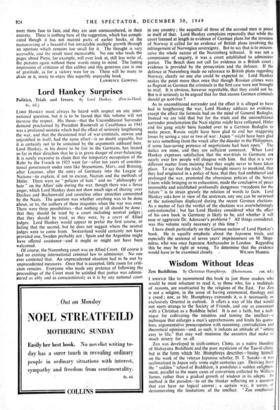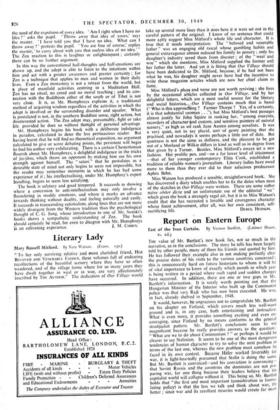Wisdom Without Ideas
Zen Buddhism. By Christmas Humphreys. (Heinemann. los. 6(1.) I SHOULD like to recommend this book to just those readers who would be most reluctant to read it, to those who, for a multitude of reasons, are unattracted by the religions of the East. For Zen is not a religion, in the sense of having ceremonial, theology and a creed ; nor, as Mr. Humphreys expounds it, is it necessarily or exclusively Oriental in outlook. It offers a way of life that would not seem strange to the Society of Friends, and one as consonant with a Christian as a Buddhist belief. It is not a faith, but .a tech- nique for cultivating the intuition and taming the intellect—a technique that enlarges a man's apprehensions and limits his queru- lous, argumentative preoccupation with reasoning, contradiction and theoretical opinions—and, as such, it induces an attitude of " sitting easy to life," that may well minimise the anxieties that make so much misery for us all.
Zen was developed in sixth-century China, as a native blending of Mahayana Buddhism and the pure mysticism of the Tao-te-ching. but in the form which Mr. Humphreys describes—basing himself on the work of the veteran Japanese scholar, D. T. Suzuki—it was acclimatised in Japan only some eight centuries ago. Deriving from the " sudden " school of Buddhism, it postulates a sudden enlighten- ment, parallel to the many cases of conversion collected by William James, rather than a gradual growth of wisdom in its adepts. Its method is the paradox—to set the thinker reflecting on a question that can have no logical answer ; a certain way, it seems, of demonstrating the limitations of the intellect. " Zen emphasises
the need of the expulsion of every idea. ' Am I right when I have no Idea ? ' asks the pupil. Throw away that idea of yours,' says
the master. I have told you that I have. no idea. What can I
throw away ? ' protests the pupil. You are free of course,' replies the master, ' to carry about with you that useless idea of no idea.'" The Zen reaction to this is laughter or enlightenment ; certainly there can be no further argument.
In this way the conventional half-thoughts and half-emotions are shown up, and the adept is able to listen to the intuitions within him and act with a greater awareness and greater certainty ; for Zen is a technique that applies to men and women in their daily lives. Even a Zen monastery is not a retreat from the world, but a place of manifold activities centring in a Meditation Hall. Zen has no ritual, no creed and no moral teaching ; and its con- nection with the Buddhism either of the south or of Tibet is not very close. It is, as Mr. Humphreys explains it, a traditional method of acquiring wisdom regardless of the activities in which the adept is involved or the surrounding disorder and squalor. What is postulated is not, in the southern Buddhist sense, right action, but disinterested action. The Zen adept may, presumably, light or take life, provided he does so without thought of personal advantage.
Mr. Humphreys begins his book with a deliberate indulgence in paradox, calculated to deter the less pertinacious reader. But having learnt that he will find no theoretical exposition, no argument calculated to give or score debating points, the persistent will begin to find his author very exhilarating. There is a certain Chestertonian flourish about Mr. Humphreys, a delightful indulgence in the tricks of jiu-jitsu, which throw an opponent by making him use his own strength against himself. The " satori " that he postulates as a desirable state of mind not only begins to seem not impossible, but the reader may remember moments in which he has had some experience of it ; his intellectualising. under Mr. Humphrey's expert handling, begins to seem less satisfying.
The book is salutary and good tempered. It succeeds in showing where a concession to anti-intellectualism may only involve a floundering in muddy emotions, and where it marks an advance towards thinking without duality..and feeling naturally and easily. It succeeds in transcending rationalism, along lines that are not more widely divergent from the Western tradition than the psychological thought of C. G. Jung, whose introduction to one of Mr. Suzuki's books shows a sympathetic understanding of Zen. The book should certainly be read, for even to disagree with Mr. Humphreys
is an enlivening experience. J. M. COHEN.































 Previous page
Previous page